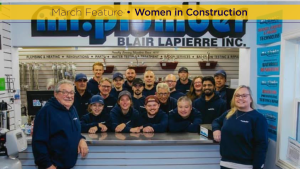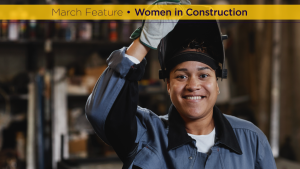Brandy Kawulka is looking forward to finally seeing the back of the COVID-19 pandemic.
She wants to start awarding the bursaries she established for women in the foundation program of joinery or carpentry at British Columbia Institute of Technology (BCIT).
Kawulka, the founder and self-titled “boss lady” of Wood Be Art in New Westminster, B.C., says she created three annual bursaries of $500 each in 2020 to help women pursuing a career in the construction trades.
“I’ve had a good career and I think trades are a great equalizer for women,” she said. “I’m at a point in my life where I can provide a hand up. Due to the pandemic there hasn’t been a way to award the bursaries but going forward there will be.”
Kawulka didn’t jump immediately into a career in the trades. Her first love was dance.
“I started dancing in Grade One in Edmonton and loved it,” she said. “I felt it was going to be my career after high school.”
Kawulka attended the Banff School of Fine Arts for a summer program while in Grade 12 and in doing so missed auditions to the major schools and dance companies back east.
“I wanted to move from Edmonton and The Goh Ballet, a Vancouver ballet school and touring company, was holding auditions after the Banff program had ended,” she said. “I auditioned and was accepted.”
As time passed Kawulka realized she needed a marketable skill, but not one that required sitting at a desk.
The trades looked like a good option, so she did a tour of the various trade shops on the Burnaby campus of BCIT.
“Something clicked when I set foot in the joinery shop,” she said.
When she applied, the Entry Level Trades Training (ELTT) program in joinery was full. As good luck would have it, however, someone dropped out, freeing up a spot for her to enroll.
We must advocate at industry and political levels for changes for better workplace diversity,
— Brandy Kawulka
Wood Be Art
After graduating from the seven-month program Kawulka began her four-year apprenticeship.
Her first job was with a Richmond, B.C. company that made custom stereo speaker boxes. Then Kawulka went to work for a large company in south Vancouver that manufactured custom carpentry products for big corporations in the U.S.
From the shop floor she was promoted to the company office, where she learned drafting and project management.
“It was there I finished my apprenticeship and became a Red Seal cabinetmaker in 1996,” said Kawulka.
A few years later, Kawulka and her husband, Paul Keller, started Wood Be Art.
“We started as a custom cabinetry shop,” said Kawulka. “The company name is a play on words that refers to quality and attention to detail. If the work we put out wasn’t so functional, it Wood (‘would’) be Art.”
Although the company today is a complete renovation contracting operation, it has only three full-time employees – Kawulka, Keller and a female assistant.
“We sub-contract most of our work,” she said. “The company has upwards of 30 trades people it deals with regularly.”
Kawulka is eager to see more Canadian women get into the construction trades. We are in desperate need of skilled people to do the work that enables Canadians to live their everyday lives in the material world, she says.
“Whether it’s major infrastructure, corner stores, or home renovation,
skilled people perform the hands-on work that can’t be outsourced to a call centre or done on a computer,” she said. “If your sewer backs up you may be able to find how-to-fix-it on YouTube, but there’s a good chance you won’t have the tools or practical know-how to do so.
“There are Google listings for plumbers, but Google won’t arrive at your door to fix the problem. A real, live plumber with tools in hand will.”
Instead of complaining or throwing up their hands in despair, people who are concerned should take action and help create a solution.
“Advocate, educate and support,” she said. “We need to educate and make our youth and their parents aware that a career in the trades is not a last resort but a first choice for a fulfilling career with many options for advancement, great money, continuous employment, travel – and no student debt.”
Kawulka says supporters of employment in the trades need to promote the field to young girls in the early school grades.
“We must advocate at industry and political levels for changes for better workplace diversity, inclusiveness, proper fitting personal protective equipment, and accommodations for pregnancy and childcare-related flex time, as women still carry most of the domestic weight,” she said.











Recent Comments
comments for this post are closed